FabricAID: The Largest Second-hand Clothing Collector in The MENA Region
Clothing has become one of the most consumed goods in our world with clothing consumption rates 400% higher today than they were just two decades ago. More than half of discarded clothing ends up in landfills where it piles up and eventually ends up being incinerated. In parallel, over 77 million people across the Arab world cannot afford to buy new clothing.
FabricAID’s circular model
FabricAID is a Lebanese social enterprise founded in 2017, tirelessly working to ensure that every individual can afford decent, quality clothing for themselves and their families, and that the fashion industry does no harm to society and the environment.
As the largest second-hand clothing collector in the MENA region, FabricAID is working to establish and scale a socially and environmentally conscious value chain for the apparel industry by optimizing the collection, sorting, upcycling, and resale of second-hand clothes. It does this through a series of socially conscious and sustainable brands targeting diverse socio-economic groups, including the extremely vulnerable.
FabricAID’s circular model gives a new purpose to unwanted products and limits the socio-economic and environmental damage of fashion predominantly by offering decent clothing at extremely affordable prices to marginalized communities through a dignified shopping experience.
FabricAID currently has more than 250 bins between Lebaron and Jordan. FabricAID revenues grew 2.85 to reach around 800,000 USD
The MENA region’s second-hand clothing
The MENA region lacks sustainable organizations specialized in second-hand clothing collection and re-distribution. Instead, NGOs and some scattered civil campaigns collect meager amounts of donated clothing.
Those NGOs face tremendous challenges in upscaling their operations since second-hand clothing collection, sorting, cleaning, and distribution systems are expensive, require intensive labor power, and are relatively complicated to operate. The absence of specialized enterprises and lack of NGO resources results in limited collection capacity and ineffective distribution.
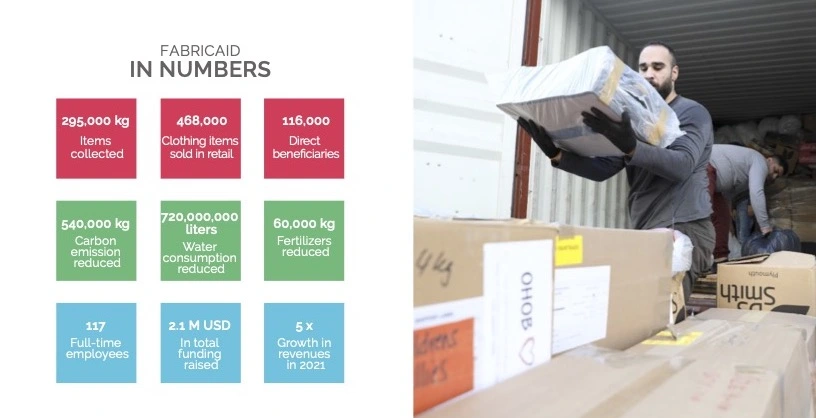
Additionally, several MENA countries, such as Lebanon, Jordan and Egypt, import high amounts of first hand clothing. This suggests that first hand imported clothes can be re-circulated within these countries through a circular value chain, making each market self-sustainable in their demand for second hand clothing.
A strong local/regional collection could potentially be complemented by import of second hand clothing when needed, but it ensures the reduction of international dumping of low quality second-hand clothes in the MENA region.
The Future of FabricAID
FabricAID is recognized as one of the world’s fastest-growing social enterprises. Establishing since the inauguration of its operations in Jan 2018 several brands across Lebanon, Jordan and now opening in Egypt. Having raised over 2,1 million US dollars, created 100+ job opportunities and grown revenues five times in 2021, FabricAID has collected 700,000 items and sold over 400,000 items.
All of what has been achieved is barely the first step for FabricAID which aims to be involved in every aspect of the fashion industry’s value chain from the agriculture of cotton passing by the manufacturing of textiles, to the production of clothes and ending the chain in reuse, upcycling and recycling. The aim of this ambition is to make the industry more sustainable, equitable, fair, accessible, and ever more rooted in the region.
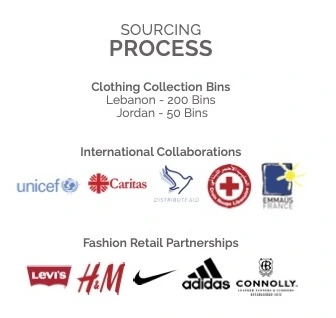
To do so, our focus is on three different methods of expansion: blitzscaling where we increase the volume of our existing brands locally, vertical expansion where we create new streams addressing the value chain of the apparel industry, and geographic expansion where we move into different markets.
Awards and Recognitions of FabricAID
UN Champion of the Earth Award: Highest award given to individuals under the age of 30 by UN environment.
Denis Pietton Award: A prestigious award given by the French institute and the French ministry of foreign affairs for outstanding endeavors in helping fellow humans.
Global Social Venture Competition in 2018: The award is one of the biggest competitions for social enterprises organized annually by the university of California Berkeley, FabricAID ranked first among 550 startups who applied for the competition.
Takreem Award: An initiative by Ricardo Karam that aims to honor Arab’s accomplishments and bring Arab achievers to the forefront at a global stage.
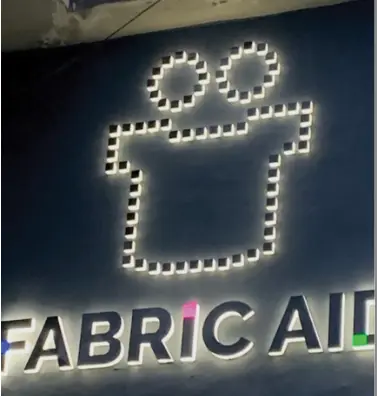
FabricAID and the International Community
For FabricAID’s department of partnerships and grants, 2022 was a crucial year. At the UScale Sustainability program in Miami, Florida, the department showcased the important work FabricAID is doing.
At the SPARK IGNITE Conference in Amsterdam, FabricAID’s network was broadened.
Partners including Al Fanar, The European Bank for Reconstruction and Development, GIZ, NUFFIC, Berytech, and The Government of The Netherlands gave funding to FabricAID to grow our social and environmental impact.
The generous support of The Government of The Netherlands will drastically expand the capacity of tailoring school of FabricAID to Include work-based learning opportunities. In addition, it will contribute to scaling up FabricAID’s upcycling capacity to fulfil international orders and promote Lebanon as a sustainable merchandise manufacturing hub.
Receiving assistance as a social enterprise from these development organizations is key to having a positive impact on Lebanon’s future and its capacity to offer meaningful employment opportunities to its youth.
Activities and Community
FabricAID believes in collaborative efforts, partnerships. and leveraging collective genius. We at FabricAID believe that our Impact echoes with the participation and Involvement of our stakeholders.
In order to shed light on the importance of donation, upcycling and limiting fabric waste, we have involved school students in different visits to our headquarters to observe the operation and intrigue interest alongside their own handmade upcycling activities
FabricAID have also participated in numerous community engagement activities such as the Marathon of Beirut, numerous career fairs, volunteer day with partner NGO’s and multiple embassy visits

FabricAID: Refashion
Souk El Khlanj
Donation Based Model: Souk El Khlanj is a second-hand retail brand providing a dignified shopping experience for marginalized communities at micro prices (average price below one USD per item).
Items sold at Souk El khlanj stores all come from donations collected through FabricAID’s sourcing capacity.
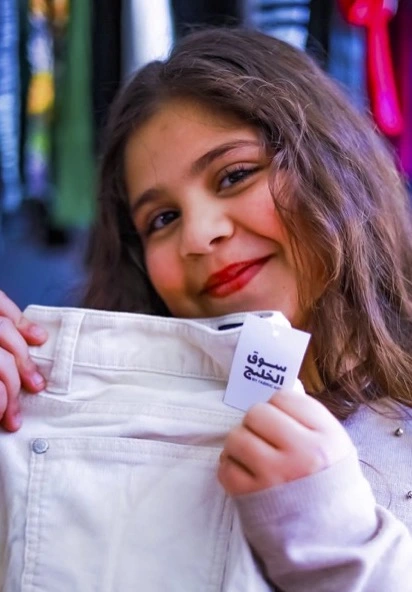
Second Base:
Hybrid Model: Second Base is a thrift and vintage clothing brand giving a second chance to unique, hipster and extraverted clothing items that are usually undesired by the marginalized communities that FabricAID targets.
Second Base doesn’t only sell vintage and thrift items, but also gives the clients the opportunity to sell their clothes in return for 25% cash back and 50% store credit.

Souk Okaz:
Independent of Donations: Retail brand where people can buy and/or sell second-hand clothes while eliminating the middle-man. The brand is specialized in bartering international fast fashion brands, targeting middle-class communities.
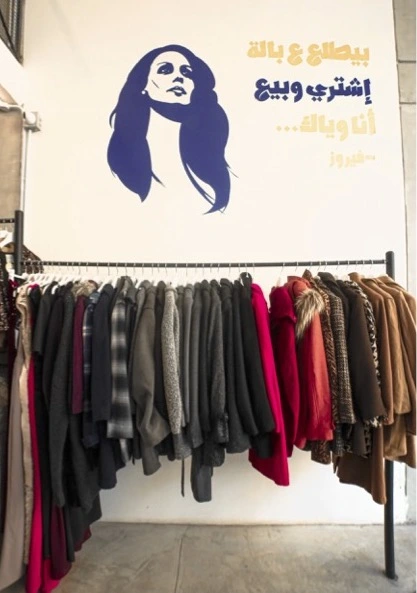
Customers at Souk Okaz are welcomed to sell their gently used clothes (provided they follow the brand’s list of accepted brands and conditions) for an attractive immediate cashback.
This brand is independent of the FabricAID donation cycle.

FabricAID: Up-cycling
SALAD:
Hybrid Model: Up-cycled clothing brand transforming clothes and especially men’s suits unfit for resale and deadstock fabrics into genderless ready wear capsule collections.
SALAD is sold through consignment deals and pop-ups regionally and Internationally.
SALAD a spin-off of FabricAID, is a sustainable genderless clothing brand born in 2022 using high-end design solutions with upcycled men’s suits and deadstock fabrics.
SALAD was launched on October 24, 2022, in a music and dance filled fashion show on the roof of Abdali Boulevard in Amman and catered to over 300 attendees.
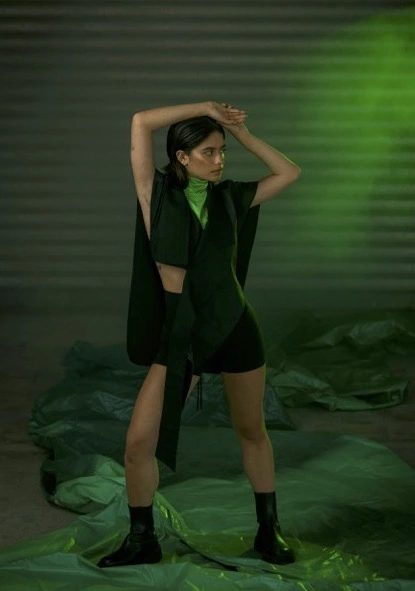
SALAD participated in exhibitions and pop-ups in Amman, Dubai, Abu Dhabi, Riyadh and Beirut, to list a few:
– FLTRD-pop-up, Dubai
– Creative Nation 961 – pop-up. Abu Dhabi
– Ana Arabia – exhibition, Riyadh
– In-action-pop-up, Beirut
And has secured over nine consignment locations.
FabricMERCH:
Hybrid Model: Up-cycled merchandise brand transforming scrap fabrics and clothing into a wide range of mass produced merchandise sold to corporations.
FabricMERCH uses damaged clothing and fabrics to create our merchandise materials utilizing techniques we developed with industry professionals. With the help of our internal laundromat services, we save fabrics from going to waste and we make sure we can utilize every item we receive from washing, dry cleaning, spot treatment, ironing and steaming.
Sold through mass production deals regionally and Internationally.

OSAS ALIVE
Hybrid Model: Up-cycled merchandise brand transforming scrap fabrics and clothing into a wide range of individual products.
Sold through mass production deals regionally and Internationally. All proceeds go back to supporting the social enterprise FabricAID.
OSAS is a spin-off brand by FabricAID that upcycles scrap material and deadstock materials into new merchandise that can be loved all over again by our clients
OSAS was displayed for the first time in the Christmas In Action event at the Forum de Beyrouth where it has proved to be a success with new clients that took Interest in the story and fell in love with the items
Stay tuned to shop OSAS online via the Instagram account and in consignment stores.





